Content from the Brookings Doha Center is now archived. In September 2021, after 14 years of impactful partnership, Brookings and the Brookings Doha Center announced that they were ending their affiliation. The Brookings Doha Center is now the Middle East Council on Global Affairs, a separate public policy institution based in Qatar.
Editor’s Note: This blog post was updated on October 9, 2012.
On October 8, 2012, presidential candidate Mitt Romney delivered a speech on U.S. foreign policy at the Virginia Military Institute. Brookings experts examine the foreign policy platform laid out by Governor Romney in the VMI speech. Suzanne Maloney assesses Romney’s remarks on Iran and advises how the Obama administration should respond to his speech. Shadi Hamid takes a closer look at a common narrative that emerged during the remarks claiming that the Obama administration has abdicated America’s leadership role in the Middle East. Justin Vaïsse examines the assertive stance Romney took during his speech. Bruce Riedel focuses on Romney’s statements regarding the Israel-Palestine conflict, al Qaeda, and Afghanistan. Michael O’Hanlon lays out his views on the most compelling elements of the speech and how it might help bring the foreign policy debate to the forefront in the closing weeks of the presidential election. Clara O’Donnell explores what a Republican win in November would mean for Europe.
Mitt Romney’s Unsettling Track Record on Iran
Suzanne Maloney, Senior Fellow, Saban Center for Middle East Policy, Foreign Policy
Predictably, Iran figured prominently in Mitt Romney’s address on Monday detailing his foreign policy positions. The issue of how to handle the threats posed by Iran has proven a reliable feature of American campaign debates for more than three decades. This reflects Washington’s deeply-held concerns about Iran’s nuclear program and support for terrorism, as well as the sense that Iran’s cartoonish clerics and messianic bombast provide a convenient foil for American politicians from both parties to exude a brawny patriotism and appeal to pro-Israeli audiences.
Gratuitous swagger on Iran has long been a part of the Romney repertoire. He has likened the Islamic Republic with the Soviet Union’s “evil empire,” tossing in an analogy to Nazi Germany for good measure. Romney has suggested that his own election is the only means of preventing Tehran from acquiring a nuclear weapon and has disparaged the Obama Administration’s diplomatic efforts on Iran as “a symbol of weakness and impotence.” None of this provides serious policy alternatives, nor does it truly reveal how a Romney administration might actually approach the intractable issue of Iran.
After all, despite all the tough talk, the track record of both U.S. political parties on Iran is far more complicated. A quick review of the historical record would show that Democratic administrations have been responsible for each of the most significant intensifications of sanctions on Iran. Meanwhile, Republican administrations have tried to ply cooperation from Tehran with weapons sales – Ronald Reagan – and have not only sought talks with Iran but actually engaged in them – George W. Bush, whose administration’s dialogue with Iranian diplomats in 2001-2003 stands as the single most successful use of diplomatic engagement with Iran since the end of the hostage crisis.
But while his posturing on Iran was not in and of itself new, Romney’s speech at the Virginia Military Institute on Monday appeared to tweak his standard message on Iran, which until now has focused on the Iranian nuclear standoff. In Monday’s speech, however, he opened up a new line of critique of the Obama administration, focused on the President’s hands-off approach to the brief but intense protest movement that emerged after the dubious 2009 reelection of President Mahmoud Ahmadinejad. “And yet when millions of Iranians took to the streets in June of 2009; when they demanded freedom from a cruel regime that threatens the world; when they cried out, are you with us or are you with them, the American president was silent,” Romney asserted.
The argument that Obama betrayed Iran’s struggling democracy movement was a throwaway line, apparently intended to link Romney’s argument on Iran to his broader critique of the current administration’s handling of the Arab spring. But it raises an important issue, one that Romney will surely revisit in future foreign policy speeches and in the upcoming debate. The accusation that Obama mishandled the 2009 protests is particularly problematic for the President, whose partisans and advisers often seem discomforted by the administration’s restraint back in 2009. Especially in the light of the subsequent revolutions in Tunisia, Egypt, Libya and Syria, many Iranians and even some Obama backers question whether Washington was on the right side of history in keeping its distance from the first salvos of Iran’s “Green Movement.”
But the administration’s self-recriminations and Romney’s casual critiques are both wrong. There is simply no evidence that more forceful American advocacy could have tipped the balance in favor of Iranian protestors in 2009. The Iranian Green Movement did not falter because of Obama’s actions or lack thereof, but rather because of the divisions within its leadership, the lack of a coherent strategy, and the Iranian regime’s willingness to use force, as well as the Iranian public’s corresponding unwillingness to continue coming to the streets in the face of that force. All these factors distinguish what happened in Iran in 2009 from the subsequent triumphs in Tahrir Square and elsewhere in the Arab world.
More to the point, Romney’s grandstanding on Iran’s long-held democratic aspirations does not offer a credible answer to the basic question that will face the next administration in dealing with Iran: is it possible to change not simply the most dangerous policies of the current Iranian government, but the nature and character of that government itself? After all, it is hard to imagine that a durable resolution to the nuclear crisis can be achieved without constructing a viable modus vivendi with Tehran, something that would appear to be unlikely given the paranoia and resentment of the current Iranian leadership. Given the long memories of the American role in the 1953 coup that unseated Iran’s elected prime minister, and the fresher memories of the disastrous U.S. experience in picking winners in Iraq, regime change is an appropriately dirty word for American policymakers in contemplating options toward Tehran. And yet there ought to be a serious conversation about how Washington and the world can cultivate a better future for Iran and encourage the emergence of responsible, representative leaders in that country.
Here, Mitt Romney’s track record is particularly unsettling. His advisors include advocates for the Mojahideen-e Khalq, a discredited, cult-like exile group that has been reluctantly removed from the U.S. government’s list of foreign terrorist organizations after a well-greased lobbying campaign. Other advisors distinguished themselves as proponents of Ahmad Chalabi and the prospect of an American ‘cakewalk’ in Iraq prior to the 2003 invasion. Romney himself boasts about his decision while governor to deny state police protection to former Iranian president Mohammad Khatami during a 2006 speech at Harvard University, apparently failing to appreciate that Khatami was responsible for efforts to strengthen Iran’s electoral institutions and curtail its worst abuses, as well as for a two-year suspension of its uranium enrichment program.
Given the ambivalence among his own team about the approach to Iran’s 2009 protest movement, Obama may be tempted to duck any challenge from Romney on this issue. He should not – rather, the President should use any Romney moralizing to challenge the governor for specific policy proposals that would advance a democratic future in Iran. It would be a welcome relief to hear both candidates offer serious ideas rather than more empty slogans on Iran.
Romney Asked the Right Questions About U.S. Policy in the Middle East
Shadi Hamid, Director of Research, Brookings Doha Center, and Fellow, Saban Center for Middle East Policy, Foreign Policy
With his Middle East speech on Monday, Mitt Romney – after much fumbling – seems to have finally found a distinct and somewhat coherent foreign policy message. Many of Romney’s critics quickly dismissed the speech. “There’s absolutely nothing in this speech,” said James Lindsay of the Council on Foreign Relations, while former secretary of state Madeleine Albright called Romney “very shallow.” Romney may not have provided the right answers, but he asked many of the right questions. In his remarks, a common narrative emerged – that the Obama administration, in its desire to reduce its footprint in the Middle East, has abdicated America’s leadership role in the region. Oddly enough, this perception is not a Republican fiction but is increasingly widespread within the Middle East itself. Obama, the argument goes, is a weak president who can be pushed around, with little consequence.
To what extent, though, is perceived American “decline” a function of specific policies choices or is it a more general issue of the projection of U.S. power, and how that power is perceived by our friends and enemies in the region? Romney seems to be arguing that the latter, however hard to measure, counts for a lot. Indeed, the debate over “leading” versus “leading from behind,” as tired as it might sound, reflects real differences in philosophy between the candidates.
In Syria, such differences have obvious and practical implications on the ground. Romney argued, with good reason, that “the President has failed to lead in Syria.” He pledged to prioritize the coordination and arming of rebel forces (although he did not specify how directly the U.S. would be involved). In contrast, the Obama administration has actively discouraged Saudi Arabia and Qatar from arming the rebels, as Robert Worth recently reported in the New York Times. Khalid al-Attiyah, Qatar’s state minister for foreign affairs, stressed the importance of getting more advanced weapons to the opposition. “But first we need the backing of the United States,” he said, in a rare, public criticism of the Obama administration. In Turkey, the feeling is closer to one of betrayal, as Turkish officials find themselves alone, on the brink of war with their Syrian neighbors, and an international community that seems uninterested in doing much about it. That is to say nothing of Syrian rebels themselves who have been calling for either arms or outright military intervention since last year. A year is a long time to wait, and they may be turning against the United States. As a member of Kafr Takharim’s revolutionary council said: “We read in the media that we are receiving things. But we haven’t seen it. We only received speeches from the West.” When Romney quoted a Syrian woman saying “we will not forget that that you forgot about us,” he was conveying a real, palpable sense that, in the eyes of a growing number of Arabs and Turks, the United States and Europe have abandoned the Syrian people. The memory of that betrayal, if it continues, is likely to have real consequences for the United States and its allies.
A second notable contrast was on aid conditionality. Romney said he would “make further reforms to our foreign assistance to create incentives for good governance, free enterprise, and greater trade, in the Middle East.” Regarding Egypt in particular, he spoke of including “clear conditions on our aid.” Nearly two years into the Arab uprisings, the Obama administration has failed to tie any existing or new aid to explicit benchmarks on political reform and democratization. U.S. military aid to Egypt continued to flow despite egregious anti-democratic behavior on the part of the Supreme Council of the Armed Forces, including waging war on civil society, dissolving a democratically elected parliament, reinstating martial law, and unilaterally stripping the presidency of many of its powers. Meanwhile, the political situation in Jordan – the second-largest per capita recipient of U.S. aid – continues to deteriorate. But a discussion of reformulating U.S. assistance there has not even begun.
What would Romney actually do about Jordan, though? Here, the tensions in Romney’s foreign policy approach become all too obvious. In his speech, Romney spoke of standing by our “friends,” but what about our friends – the leaders of Jordan, Saudi Arabia, the United Arab Emirates, and Kuwait – who have actually become more repressive in the wake of the same Arab Spring that Romney claims to support? Instead of urging Gulf countries to take reform seriously, Romney pledged to “deepen our cooperation with our partners in the Gulf.”
It is also remarkable that Romney managed to run through an entire speech on the Middle East without mentioning the word “Islamist” even once. Neoconservatives within the Republican Party prioritize democracy promotion but, like the Tea Party faction of the party, they also fear the effect Islamists will have on U.S. interests, including Israel’s security (I discuss intra-Republican differences in this recent Brookings paper). The problem is that democratic openings inevitably benefit Islamist parties. Again, the tensions here seem irreconcilable, which is probably why Romney avoided addressing them.
It was President George W. Bush who once said that “America’s vital interests and our deepest beliefs are now one.” Unfortunately, they are not, and won’t be anytime soon. Sometimes, difficult choices have to be made, but Romney does not appear willing to make them. But, then again, neither does Obama. The Arab revolts have, in some ways, closed the gap between interests and ideals (as in Libya and Syria), yet, at the same time, they have made the policy contradictions all the more obvious (as in Bahrain). Whatever else might be said about it, Romney’s speech did us the service of highlighting those contradictions. Instead of doubling down on President Obama’s flawed Middle East record, Obama’s supporters (and, if he wins, Obama himself) should engage with the substance of Republican critiques and outline a vision for re-thinking and re-orienting U.S. policy in the region. Otherwise, the contradictions – which have damaged U.S. credibility in the region for decades – will persist. And so too will the consequences.
Romney Offers Clear Choices. But Are They Sustainable?
Justin Vaïsse, Director of Research, Center on the United States and Europe, and Senior Fellow, Foreign Policy
Contrary to the strategy he followed in the first presidential debate last Thursday, Mitt Romney did not try to strike a more moderate tone in his foreign policy speech on Monday. Instead, he maintained a hawkish, neoconservative line. He thus confirmed the two campaign choices he made in the summer of 2011 – but opened himself to questions about the economics of his assertiveness.
The first choice is to ignore the growing number of Republicans and Independents who are tired of foreign interventions (see here and here) and are not convinced that defense spending should be increased. This was not always the case. In June 2011 for example, Romney said it was time to “bring our troops home” from Afghanistan “as soon as we possibly can.” This rhetoric was replaced by a much more hawkish stance, especially in his speech at The Citadel a year ago, where he started talking about “a new American century,” insisting soon afterwards that it was “not time for America to cut and run” from Afghanistan.
In his speech of Monday, Romney acknowledged the existence of this anti-interventionist strain (“I know many Americans are asking whether our country today—with our ailing economy, and our massive debt, and after 11 years at war—is still capable of leading”), but only to unambiguously reassert his preference for an internationalist and hawkish posture. In purely electoral terms, it means that he expects more votes from his attacks on President Obama’s perceived weakness and lack of leadership than he fears losing them from anti-interventionist Republicans and Independents, or from his association with the neoconservatives.
That is the second choice Mitt Romney made in the summer of 2011. He adopted a foreign policy line which checks all the boxes of neoconservatism, the school of thought associated with the administration of George W. Bush and the 2003 Iraq war. That foreign policy tradition, which dates back to the 1970s, is based on five pillars (internationalism, primacy, unilateralism, militarism and democracy), which were all present in one form or another in Romney’s speech on Monday, most notably in sentences like “if America does not lead, others will—others who do not share our interests and our values—and the world will grow darker” or “our friends and allies across the globe do not want less American leadership. They want more.”
Romney’s positioning is thus very clear, but he opens himself to criticism on various counts. First, given Obama’s image on national security, which is unusually strong for a Democratic candidate thanks to the Bin Laden raid and his decisive use of drones, it might not be the best electoral strategy to use the traditional line of attack of Democrats as weak and insufficiently patriotic. Second, it is hard for Romney to present himself as more assertive than Obama without crossing the fine line between hawkishness and adventurism. Whether on Syria, Iran, Afghanistan or China, Romney outlines policies that are actually not very different from the President’s; you have to believe the rhetoric in order to detect the existence of a real gap.
Lastly, there might be cause for skepticism about the fiscal and diplomatic sustainability of his foreign policy. Even without buying into the current wave of declinism, it is hard to deny that America’s power relative to that of other countries has indeed decreased, and a posture of uncompromising hawkishness (Iran), toughness (Russia, China), or conditionality (Egypt; foreign aid) vis-à-vis the rest of the world –what James Traub dubbed the “more enemies, fewer friends doctrine” – might not be the most effective way to fulfill America’s objectives. This is all the more true that America’s resources will necessarily be strained in the next four years, and that the issue of the debt will loom large.
This leads to the most serious questions about Romney’s speech. Although he has found it difficult, because the Middle East has a way to always force itself back to the agenda, President Obama has tried to redistribute American diplomatic and military assets away from that region and towards emerging powers, especially in the Asia-Pacific, where the stakes are highest in the long term. More generally, he has tried to rebalance U.S. foreign policy towards global and economic issues and away from land wars and counter-terrorism. In his speech of Monday, the Romney outlined a world which closely resembled the one George W. Bush inhabited, as if frozen in time circa 2005. He didn’t really talk about China and the Asia-Pacific region, and mentioned economics only when talking about free trade. One only needs to read Robert Zoellick’s excellent analysis “The Currency of Power” to be convinced of the imperious necessity to integrate economics into any foreign policy strategy. Such integration was thoroughly lacking in Romney’s speech. But since he picked Zoellick to head his national security transition team, perhaps that dimension will eventually be added, if he reaches the White House?
Governor Romney’s Approach to the Middle East
Bruce Riedel, Senior Fellow, Saban Center for Middle East Policy, Foreign Policy
Governor Romney’s foreign policy speech at VMI is a timely and constructive contribution to the presidential campaign. He has delivered a thoughtful critique of the Obama record in the Middle East and provided some specific policy proposals. Importantly, Gov. Romney stated his commitment to a two state solution of the Israel-Palestine conflict, an issue his previous statements had left confused at best. Romney gave no road map for how to secure a peace agreement but he acknowledged the need to do so.
Romney also rightly assessed the threat still posed by al Qaeda. It has been bloodied in Pakistan by the 300 drone strikes since Obama’s inauguration and the death of Osama bin Laden but it is not defeated. The chaos across the Arab world has opened the door for al Qaeda’s comeback from Yemen to Mali. It is indeed clear now it had a role in the Benghazi attack on the 11th anniversary of 911. Aside from calls to leadership, however, we don’t have much answer to how a Romney administration will fight al Qaeda differently. Standing by Israel, stopping Iran’s nuclear ambitions and keeping close ties to Saudi Arabia may be good policies in their own right but don’t really address the al Qaeda challenge. Drones indeed are not a strategy, as the VMI speech notes, but what is the strategy to fight al Qaeda?
The governor was helpfully a little more clear on Afghanistan but here he also left room for more to come. He appears to accept the 2014 date for transition to Afghan leadership but seems to open the door to a reappraisal if battlefield conditions warrant. That is smart, we need flexibility. Does he mean he will keep more troops longer if his generals say they are needed? The even harder problem is how to deal with Pakistan which backs the Taliban and harbors its leaders but which has gotten $25 billion in aid from two administrations since 911, one Republican and one Democrat. How can we defeat the Taliban if Pakistan insists on backing them? Is Romney still opposed to talks with the Taliban as he stated last spring?
The VMI speech is a good start to what needs to be a far more vigorous and detailed debate in the next month. Both candidates need to be much sharper on the challenges ahead. The war in Afghanistan is eleven years old today but a successful outcome is still elusive. The Arab awakening is changing the politics of an entire region more decisively than any event in its recent history. The debate is critical. The time for vague soundbites is over.
A Good Speech for America, Regardless Who Wins
Michael E. O’Hanlon, Director of Research, Foreign Policy at Brookings, The Sydney Stein, Jr. Chair, and Senior Fellow, 21st Century Defense Initiative, Foreign Policy at Brookings
While I did not agree with everything Governor Romney said in his foreign policy speech at VMI today, and while I have particular differences of opinion with the Governor over the necessity of his proposed defense spending levels, he delivered a good speech on balance. However, the Governor’s critiques of President Obama’s handling of the attack on the U.S. consulate in Libya and the Iranian elections of 2009, as well as the Administration’s “pivot” towards Asia in recent years, were not compelling. Romney’s promise not to show flexibility towards Russia on missile defense was too categorical as well, but one must expect differences of opinion during a presidential campaign.
That said, the speech was still effective in many ways, because Romney conveyed a sense of sustained American engagement with the world that is welcome at a time when our domestic economic situation could easily produce a “Come home, America” mentality among the voting public. Instead, Romney talked about being patient in Afghanistan, and doing more to help the Libyan revolution in language that echoed that of nation-building advocates of the past. Romney also spoke of helping the Syrian opposition a bit more – without dragging the United States into war – and consolidating aid programs under a single leader in the U.S. government, which would make these programs more effective and would support certain Middle East countries in their efforts to make their revolutions succeed on terms that overlap with American interests.
These ideas generally make sense to me individually, and taken together they suggest ongoing American leadership in the world, regardless of who wins the election. I don’t know which party the speech will help most on November 6, but on balance I think it is a speech—and a type of foreign policy debate—that is good for the country either way.
What Romney Would Mean for Europe
Centre for European Reform, October/November 2012
Clara M. O’Donnell, Nonresident Fellow, Center on the United States and Europe, Foreign Policy
As the U.S. elections approach, Mitt Romney’s sometimes bellicose rhetoric on national security is raising European eyebrows. But many in Washington believe that if the Republican contender were to become president, U.S. policies might not differ much from the last four years. Despite Romney’s strong criticism of Barack Obama, some of the challenger’s views on foreign policy issues are similar to the president’s. And the points on which they disagree may matter little: U.S. presidents rarely implement their more outlandish campaign pledges. In any case, Congress will continue to set limits on U.S. policy on issues such as the Arab-Israeli conflict and nuclear arms control, whoever the president. But, if Mitt Romney genuinely believes much of his foreign policy rhetoric, a Republican victory in November could mean difficult times for transatlantic relations.
The former governor has, for example, identified Russia as America’s “number one geopolitical foe.” He considers Obama’s ‘reset’ with Moscow to have been a failure. He opposed ratification of the New START treaty on strategic weapons reductions because it supposedly allows Russia to expand its nuclear arsenal – Romney has notably warned that the treaty, unprecedentedly, allows Russia to mount intercontinental ballistic missiles on bombers. The Republican candidate has also strongly criticised Obama’s missile defence plan as less technologically reliable and ambitious than that of George W. Bush, and for downgrading the involvement of U.S. allies Poland and the Czech Republic.
Europeans, however, welcomed the U.S.-Russia reset. Many of them worry about Vladimir Putin’s authoritarianism and non-co-operation on Syria. But most Europeans think the reset has made Russia more helpful on Afghanistan and Iran. They like New START, and many EU governments will have been confused by Romney’s concerns about bombers equipped with intercontinental ballistic missiles. Indeed it would be impossible for a bomber to take off with such a heavy load. Even EU countries that are more hawkish on Russia are likely to see Romney’s views as unnecessarily antagonistic. Initial concerns in Poland and the Czech Republic about the Obama administration’s commitment to their security have been largely addressed, after the US placed fighter jets in central Europe and started holding regular military exercises there. And Poland has been working on its own reset with Russia in recent years.
The Brookings Institution is committed to quality, independence, and impact.
We are supported by a diverse array of funders. In line with our values and policies, each Brookings publication represents the sole views of its author(s).
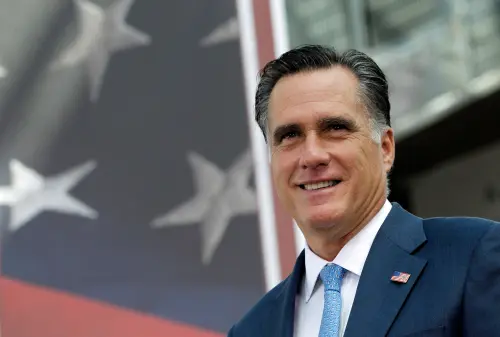
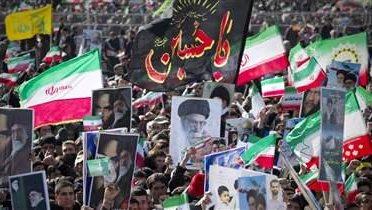
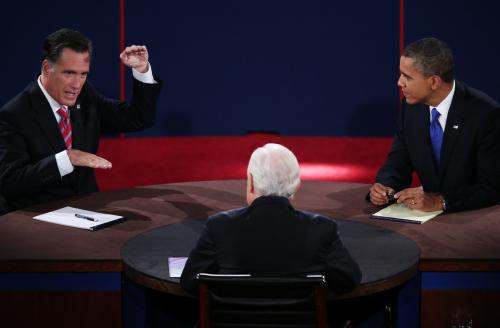


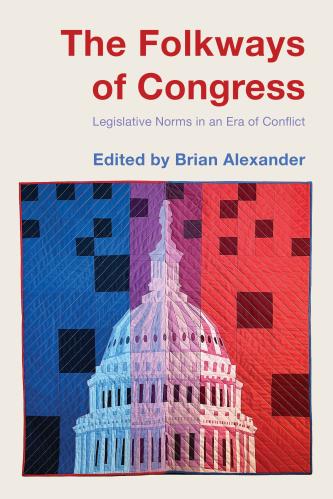


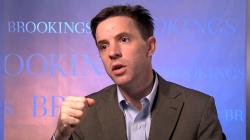



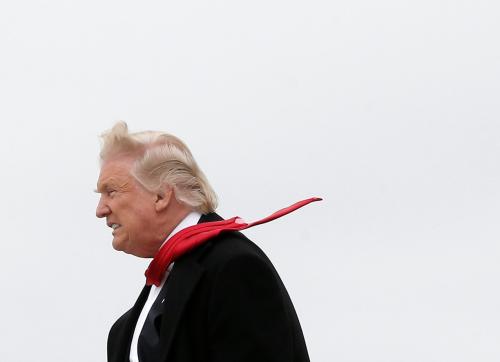
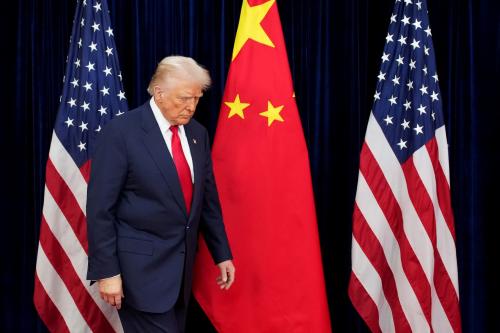

Commentary
Mitt Romney’s Foreign Policy Agenda
October 9, 2012